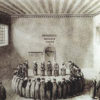The Kabbalah is Jewish mysticism. Sufism is Islamic mysticism, and though having been influenced by Sikhism, it isn’t Sikhism.
Have you noted that Islam seemed to be far more scientifically tolerant than Christianity? It’s sort of ingrained into the original native culture of Islam. They were even the ones who preserved the c-section, astrological charts, the library of Alexandria. They were very pro-knowledge. Well, Sufism isn’t directly a school of Islamic religious practice. It goes above and beyond the mainstream Islam, but it’s not seen as a heretical practice. At least not directly.
The basic intention behind Sufism is to arrive at a realization of the truth which they see as synonymous with God. They do this by a pious devotion to contemplation of God, as well as acts intended to bring one closer to Gods nature. So, where the law of Islam is seen as indispensable to peace and right living of a Muslim community, it‘s observed by a Sufi, but they go further. They do have a lineage, and established orders, because it’s believed that hearing the knowledge of Sufism without being in the resulting spiritual presence would be insufficient.
Presence of a teacher? Yes, and the only fit Sufi teacher is one who adheres to it in their “private” lives. Anyone purporting to be a Sufi master, but living an ostentatious life, would be laughed at.
So Islam says live right and all will be well, and Sufism says you also have to attain an understanding? Yes, basically. Sufism is mysticism so it has traits in common with Gnosticism. They believe that with right understanding and right practice, knowledge of God is available now. Where mainstream Islam holds that you will know God only after a pious life.
The major argument between Sufism and mainstream Islam is the relationship of God to creation. One school of Sufism states that any and all being, only has being, because of the presence of God, and without God there is no being. This is heavily criticised as not really being Islamic thought, but Islam and its Sufism did move into India and had contact. So that criticism is not without basis, even if it’s culturally biased. Nominally, Sufism is Islamic devotion, so this school of thought borders on heresy. The other school of Sufi thought is that by devotion you come to perceive the connection of all being with God, though God isn’t directly connected to matter, and this is seen as more acceptable in orthodox Islamic views.
Heresy to basically claim you’re God? Yes. Though some highly respected Sufi mystics are still on record when they were in a state of contemplative ecstasy speaking as if they were God. Not unlike the behaviour of the Jewish teacher known as Jesus. A Sufi mystic is also known as a Dervish, and though they have many practices that serve as aids to a cornerstone practice, they refer to it as remembrance of God. They are not believed to have that power without first the proper belief.
Dervish dancers? Yes. That’s a Sufi practice. Traditionally, all Sufis are Muslim, but not all Muslims are Sufi, and Sikhs are their own religion. Sufis are not.
Your thoughts are welcome. Be well friends.
Travis Saunders
Dragon Intuitive
~science,mysticism,spirituality~



Leave a Reply